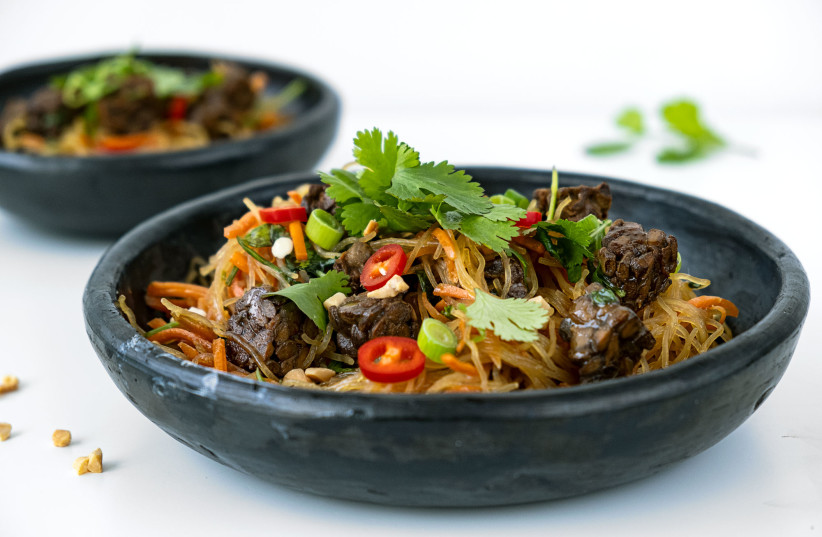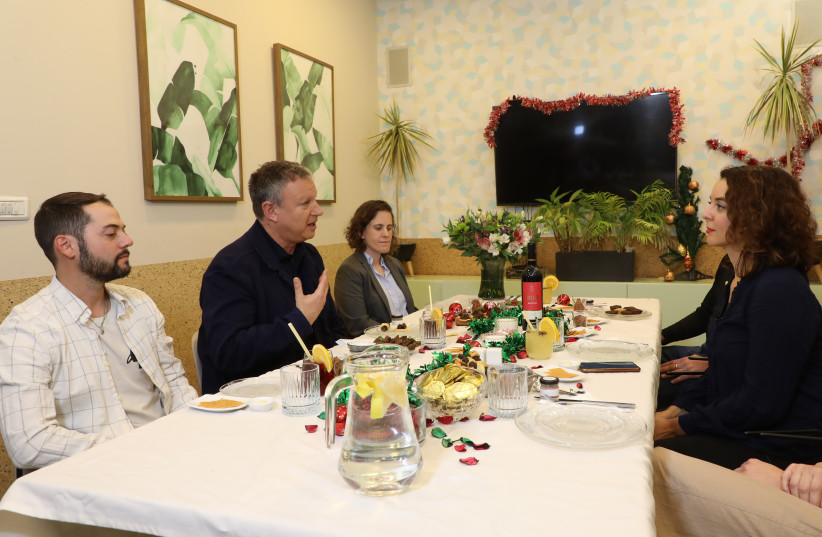Turkey, roast beef and glazed ham – when people think of iconic Christmas foods, these are just some of the dishes that come to mind.
For more stories from The Media Line go to themedialine.org
Yet the future of the festive Christmas dinner could very well soon rely on alternative proteins and meat-free recipes, including mycelium-based sausages, locust burgers and vegan desserts.
A futuristic feast
Ahead of the holiday, The Media Line and four food tech startups recently met together at Jerusalem Venture Partners’ Margalit Startup City in Jerusalem for a futuristic feast aimed at showcasing innovative treats that might soon be coming to a dinner table near you.
The menu included juicy barbecue sausages made from mycelium, a type of mushroom, as well as flavorful locust burgers, red curry patties and a range of delectable vegan desserts.
JVP, or Jerusalem Venture Partners, is an international venture capital firm that specializes in investments in startups. One of the firm’s main areas of focus is on food tech and alternative protein products.
“In the next 10 years, food as we know it will change forever,” Erel Margalit, founder and chairman of JVP and Margalit Startup City, told The Media Line. “The food tech companies that we have here come from the Galilee, Jerusalem and all over Israel. [They] are bringing new ideas for alternative proteins. But in order for people to accept that, they need something tasty, they need it to taste just as good.”
Alternative proteins are growing increasingly popular in the food industry, driven in part by rising environmental, ethical and health concerns surrounding animal agriculture. In fact, global food production accounts for 35% of all human-made greenhouse gas emissions – with animal products making up the majority of that – and food production taking up more than one-third of our planet’s land, according to the World Economic Forum.
“We cannot continue to feed the planet by using primarily cows as our protein,” according to Margalit. “We’re slaughtering 50 billion cows and this planet is not big enough for the pastures that they need in order to eat. Agriculture is no longer serving people, it’s serving cows.”
One of startups that is part of the plant-based diet revolution is InnovoPro, which has a developed a range of products – both savory and sweet – based on chickpeas. On offer at the Jerusalem feast were egg-free meringues, vegan mayo, chocolate mousse and hazelnut pudding.
“InnovoPro is producing a protein out of chickpea,” Daniela Rabinovici, VP marketing at the company, told The Media Line. “We have a unique extraction technology. We take the chickpea and we extract it and have a high level of protein that is very versatile. It can be used both in dairy alternatives, egg replacements and meat alternatives,” she said.
Also on the table were a range of mycelium-based dishes produced by Kinoko-Tech, including pigs in a blanket, puff pastry with caramelized onion and sautéed mycelium, as well as patties in a rich red curry and coconut cream sauce.

Another startup trying to change the food arena is Blue Huna, which transforms agricultural waste into environmentally friendly single-use utensils. The company’s straws, for instance, are biodegradable.
“Currently in the world, we only use about 30% of the agricultural [output] in the world. The rest is being burned or thrown out,” Einon Shir, co-founder of Blue Huna, told The Media Line.
Locust protein
But perhaps the most unusual food tech startup attending the dinner was Hargol FoodTech, the first company in the world to reach commercial-scale production of an alternative protein from locust.
The burgers on offer that day were produced with a mix of chicken and ground locust, a perhaps surprisingly delicious combination.
“Locusts are nature’s most efficient protein source,” Dror Tamir, co-founder and CEO at the Hargol FoodTech, told The Media Line. “This animal naturally contains 72% complete protein and they are rich with essential nutrients.”
Locusts are a sustainable and nutrient-rich source of protein that is rapidly gaining attention in the food tech sector, especially since they are easy to raise and require minimal resources.

Though the psychological barrier of eating insects may prove to be the biggest hurdle, this writer can at least confirm that, when mixed with chicken, locusts taste surprisingly like beef.
“The food is fantastic,” Margalit said of the Christmas fare. “Whether it’s a mushroom where the texture is almost like meat, or locusts in hamburgers that taste like foie gras, or chickpea protein that is changing yogurt and ice cream forever – all of these ideas and many more are looking at the future. We’ll all eat like this and food is going to change forever.”

